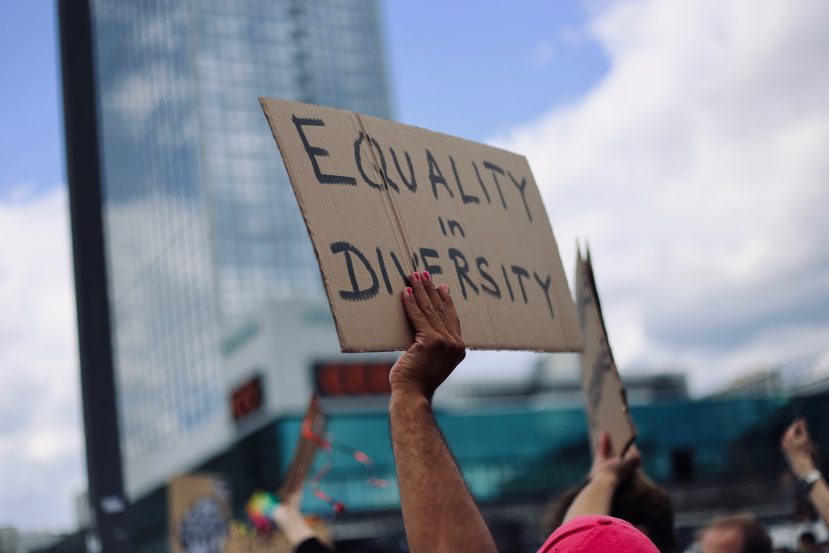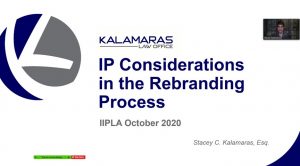There are many reasons why brands might need to change their name or undergo a rebranding effort. For the past three months, outcries for racial justice reform has been in the spotlight and many brands have stepped up to ensure their brands and imagery reflect racial equality and inclusiveness for all. Many established brands, however, are not strangers to evolving their brands and imagery. Especially for brands in the world of sports, many teams have used monikers that have long marginalized Native peoples. The fact remains that brands are living, breathing assets of a company, and to be relevant with consumers, brands need to continually evaluate if their brand is relevant to their consumer constituency and make any necessary adjustments as circumstances, whether racial, economic or behavioral patterns change.
Presenting to the Iowa Intellectual Property Association
On Friday. October 2, 2020, I had the privilege to present a one-hour virtual webinar entitled “IP Considerations in the Rebranding Process,” to a group of fellow attorneys at the Iowa Intellectual Property Association’s Annual Meeting. The webinar focused on many of key reasons brands might need to undergo a name change – from a trademark infringement battle to a translation issue when expanding to a foreign market to a brand name no longer fitting the scope of the goods or services. The primary purpose of the webinar, however, was to talk about the role trademark counsel can have when their clients go through any rebranding process.
I used the two decades long litigation battle the Washington Redskins have endured as my case study and discussed how team ownership botched its opportunity to choose a new trademark throughout that litigation before the pressure built up over the Summer of 2020 to such a degree that three of its key sponsors exerted such economic pressure on the team that it virtually had no choice but to make a decision it should have made years ago to ensure the Washington Redskins name reflects racial equality and inclusiveness for all. Those sponsors’ actions led to team ownership making the decision on July 23, 2020 to change its name. Unfortunately, due to the mishandling of the process both from a rebranding and legal standpoint, the team did not properly plan for a new name or vet any new names and as a result was left with the option to announce its interim name for the season while it sorts out its legal issues. Since 2014, a few speculators have fraudulently filed trademarks for potential new names for the team, and since team ownership never expected to change its name, it did nothing to combat this behavior. It now must contend with all of these issues and more before it can move forward. The entire situation was preventable and a perfect example of what not to do, so it was the perfect teaching case. We also discussed ways in which team ownership could have proceeded, and ways in which other clients could proceed in a similar situation.
Other Brands Announced Changes
As it turns out, many other brands have recently announced they have or are moving forward in adapting their brands’ to create a more inclusive brand or image, including Land O Lakes, which in February 2020 removed the Native American woman from its packaging and updated its package imagery in advance of its 100th anniversary next year. Uncle Ben’s recently announced in September 2020 that moving forward it will be known as Ben’s Original and will drop all images of the African American male butler that has donned its packaging for decades. Other brands’ names and/or imagery is under review, including Aunt Jemima, Cream of Wheat (likely the package imagery only), Mrs. Butterworth’s (likely the bottle shape), and Eskimo Pie to name a few. While many would say “What took so long?”, I think these brands deserve credit for listening, no matter how long it took. Progress is a good thing. We are all trying to listen and educate ourselves. Whether you agree with the changes your favorite brands are making to be more inclusive or not, ultimately, consumers will have to vote with their wallets, and the brands may have to undertake further adjustments. That’s what makes brands so great – they are valued by the consumers who purchase them.
If you are interested in having me present this webinar for your organization or learning more about the intersection of branding, racial justice, and intellectual property rights, please feel free to contact me.

Stacey C. Kalamaras is the founding partner of Kalamaras Law Office, LLC. She has extensive intellectual property experience with a particular focus on trademark prosecution and enforcement. She has protected some the world’s largest brands in more than 150 countries and specializes in helping small and medium sized businesses grow and protect their brands. Contact her at info@klolegal.com.
Stacey is also the founder and lead instructor of Trademarkabilities®, an online trademark academy for lawyers, whose mission it is to prepare lawyers to be confident and effective practitioners before the USPTO. To learn more, please visit https://www.trademarkabilities.com/.


